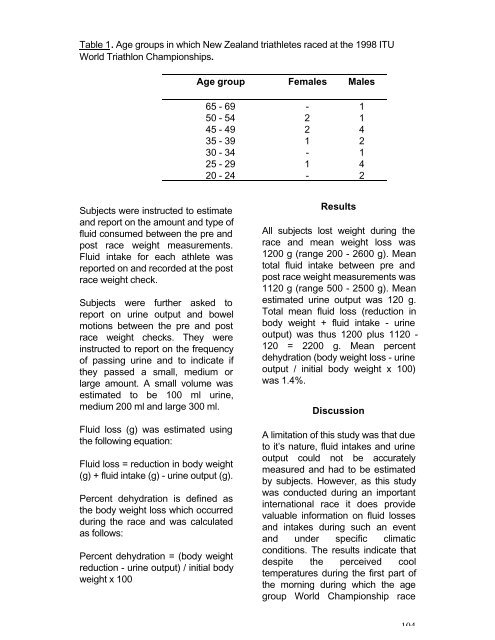MAXIMISING OLYMPIC DISTANCE TRIATHLON PERFORMANCE ...
MAXIMISING OLYMPIC DISTANCE TRIATHLON PERFORMANCE ...
MAXIMISING OLYMPIC DISTANCE TRIATHLON PERFORMANCE ...
You also want an ePaper? Increase the reach of your titles
YUMPU automatically turns print PDFs into web optimized ePapers that Google loves.
Table 1. Age groups in which New Zealand triathletes raced at the 1998 ITUWorld Triathlon Championships.Age group Females Males65 - 69 - 150 - 54 2 145 - 49 2 435 - 39 1 230 - 34 - 125 - 29 1 420 - 24 - 2Subjects were instructed to estimateand report on the amount and type offluid consumed between the pre andpost race weight measurements.Fluid intake for each athlete wasreported on and recorded at the postrace weight check.Subjects were further asked toreport on urine output and bowelmotions between the pre and postrace weight checks. They wereinstructed to report on the frequencyof passing urine and to indicate ifthey passed a small, medium orlarge amount. A small volume wasestimated to be 100 ml urine,medium 200 ml and large 300 ml.Fluid loss (g) was estimated usingthe following equation:Fluid loss = reduction in body weight(g) + fluid intake (g) - urine output (g).Percent dehydration is defined asthe body weight loss which occurredduring the race and was calculatedas follows:Percent dehydration = (body weightreduction - urine output) / initial bodyweight x 100ResultsAll subjects lost weight during therace and mean weight loss was1200 g (range 200 - 2600 g). Meantotal fluid intake between pre andpost race weight measurements was1120 g (range 500 - 2500 g). Meanestimated urine output was 120 g.Total mean fluid loss (reduction inbody weight + fluid intake - urineoutput) was thus 1200 plus 1120 -120 = 2200 g. Mean percentdehydration (body weight loss - urineoutput / initial body weight x 100)was 1.4%.DiscussionA limitation of this study was that dueto it’s nature, fluid intakes and urineoutput could not be accuratelymeasured and had to be estimatedby subjects. However, as this studywas conducted during an importantinternational race it does providevaluable information on fluid lossesand intakes during such an eventand under specific climaticconditions. The results indicate thatdespite the perceived cooltemperatures during the first part ofthe morning during which the agegroup World Championship race104


